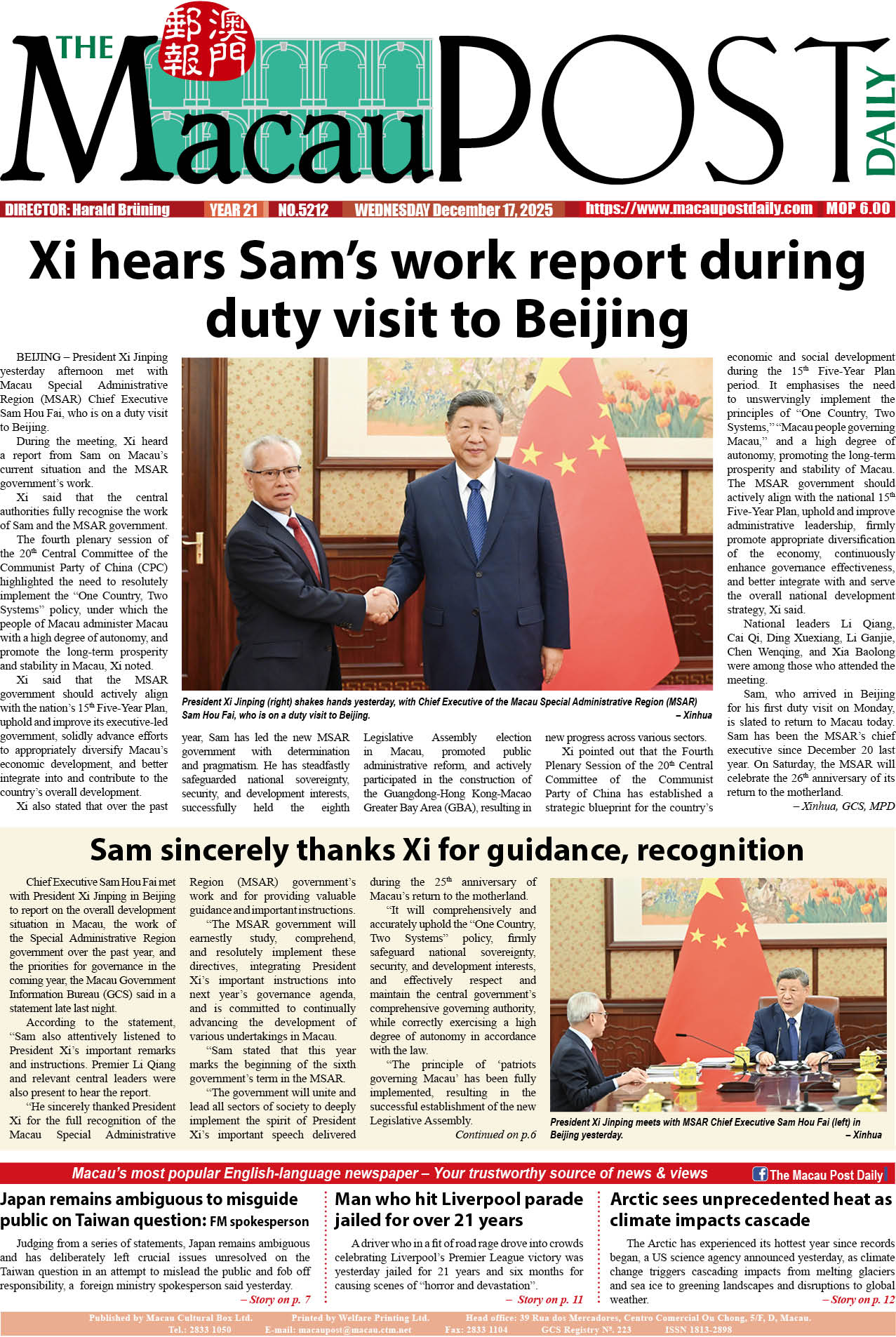Prisca Tang
The executive chef of Wing Lei Palace at Wynn Palace – the only local restaurant that made the “Asia’s 50 Best Restaurants”, Tam Kwok Fung, told The Macau Post Daily in a recent interview at the restaurant that the secret ingredient that he uses while cooking is his “attention to detail”.
Q: How do you feel about being the executive chef of the only local restaurant listed on the Asia’s 50 Best Restaurants list?
A: I am happy to know that Wing Lei Palace was listed. Secondly, this acknowledgement also belongs to the serving and kitchen staff. A good dining experience is no longer limited to the quality of the ingredients or the technique-used for the dish but it expands to the entire dining experience.
The standards for fine dining have been increasing over the past 20-30 years. The new standards do not only apply to Chinese cuisines but they also apply to all cuisines around the world. People nowadays can travel around the world easily, hence they compare their experiences to a more international standard.
For example, now customers will ask for tea or wine pairing and they have started to place emphasis on their lifestyle. They will also pay attention to the service, the sequence of food being served and the menu.
Every detail is important. Each step from the kitchen to the table requires a lot of attention. Even how long each course takes for the customer to consume concerns the kitchen staff. If a chef can optimise the dining experience, it will make customers’ meals more enjoyable.
Moreover, having internationally-renowned organisations send their mystery diners to restaurants in Asia proves the influence of Asian cuisines. The restaurant lists and rankings also help us improve and better our food and service quality.
Customer is source of inspiration
Q: According to Asia’s 50 Best Restaurant’s website, you change your menu daily. How can you find the inspiration to create authentic, luxurious and tasty dishes? And how do you ensure each dish’s quality and consistency?
A: The interaction with customers is my main source of inspiration. For example, when I personally talk to my guests, sometimes they want something more exciting. Then I will choose courses that are slightly outside their usual orders.
Sometimes minor adjustments are made when the customer has specific preferences. For example, for our set dim sum menu, if people do not like pork, we can replace filling in the Siu Mai with fish.
I only make adjustments that make sense and do not ruin the flavour of the dish. Customers always give me constructive feedback on my dishes, on the flavouring, portion size, or tell me what ingredients are popular, trendy or seasonal at the moment. I will explore different ingredients according to my customers’ liking. For example, a lot of people like Japanese cuisine because they like the seafood and fresh ingredients. Then I will look for fresher seafood to satisfy my customers’ wants.
I also do market research on top of surveying my customers. My supplier tells me what the seasonal ingredients are and which are more popular at the moment.
My creativity comes from experiencing ingredients from different countries or how to plate a dish. I still place a lot of emphasis on the authentic techniques and Chinese culinary skills.
Moreover, I know that ‘preparation is key’ is a cliché but it is true. My kitchen is always prepared for minor adjustments. The kitchen staff also have a lot of on-the-job training. In the kitchen we use division of labour to ensure that each person is an expert at what he or she is doing.
Q: According to Wing Lei Palace’s website, you won a gold medal at the 5th World Championship of Chinese Cooking in Guangdong. Despite competing against the world’s greatest Chinese chefs, you managed to win the gold medal. What do you think your unique skills are that made you stand out amongst all the competitors?
A: Like art, people can feel your hard work through your work. If the chef is in a good mood and has a good state of mind, the judges can feel it through your food. People can feel your earnestness and your willingness to serve. That is also the difference between casual dining and fine dining. My interpretation of fine dining is that each dish is made exclusively for a table of customers, and it takes a chef’s heart and mind to accomplish the whole meal. People can feel it whether it’s a generic meal or a meal made with the chef’s great attention to detail.
Don’t change for the sake of changing
Q: You used to manage the food and beverage departments of Mandarin Oriental and Peninsula Hotel in Bangkok. How do you manage to strike a balance between preserving authenticity and adapting to local taste buds?
A: Authenticity is always the goal of my work. Even if a Chinese chef works in another country, of course it is important to know more about the local palette, but it is more important to cook the authentic flavour. In Thailand, due to its religious and cultural background, people usually prefer white meat and seafood. Therefore, I would have more chicken and seafood dishes with only a few beef or pork options.
When people visit a Chinese restaurant outside of China, they are usually looking for authenticity. Therefore, I don’t change for the sake of changing. Customers come to restaurant because they have faith in me that I would present the most authentic dishes. This is the reason why when I was working in Thailand I had the opportunity to look after many heads of state, royal families and diplomats.
Meanwhile, under the influence of globalisation ingredients are accessible wherever one goes. My location no longer limits my accessibility to the quality and quantity of the finest ingredients.
Bringing the world back to Macau
Q: What special local eating cultures or habits have you noticed?
A: Macau residents are more open-minded when it comes to different cuisines. They also have a wider palette because of the Eastern and Western influences. They tend to be more adventurous and willing to try new things, while people that grow up only either in the Eastern or the Western cultures tend to have a more conservative taste buds. I would say Macau people understand and appreciate good gourmet food.
Q: Do you think Macau people have high standards for their food?
A: Quite a number of local residents are returnees from foreign countries. They usually bring the world back to Macau after seeing the world. Their experience overseas also helped to bring the international standards to Macau. It is also because of those intercultural exchanges that took Asian food to the international culinary stage. Nowadays, more and more 5-star hotels are starting to pay more attention to Asian cuisines.
As the economic situation improves, people tend to have higher standards for the dishes they consume. New restaurants also aim to meet the fine dining standards and suppliers are more aware of the quality of the products. Macau people are privileged. They are able to access most of the ingredients from around the world, so they now care more about the quality of what they eat.
Q: Macau is a UNESCO Creative City of Gastronomy, and the government is highlighting Macanese cuisine. How can traditional Chinese cuisine play its role in the Creative City of Gastronomy?
A: Macanese cuisine is a combination of Chinese and Portuguese culture. The Chinese influence still plays an important role in Macau’s eating culture. It is because of the different elements of the city that has made the city a Creative City of Gastronomy. Cuisines evolve through time but traditional Chinese cuisine will always have an impact on Macau’s local gastronomy.
Having a service mind & attention to detail
Q: Can you tell me your journey of becoming a chef?
A: I always knew I wanted to be a chef. For as long as I can remember, even when I was little, I was intrigued by the kitchen. However, it is different when you turn a hobby to a career. A piece of advice that I could give to the public is that no matter what position you are in, you have to practise and concentrate on your work. From unfamiliar to familiar then perfect it. As long as you put your heart and concentration into your work and observe the reactions and listen to the criticisms of people around you, then you will be able to hone your work.
Having a service mind and attention to detail is my key to success.
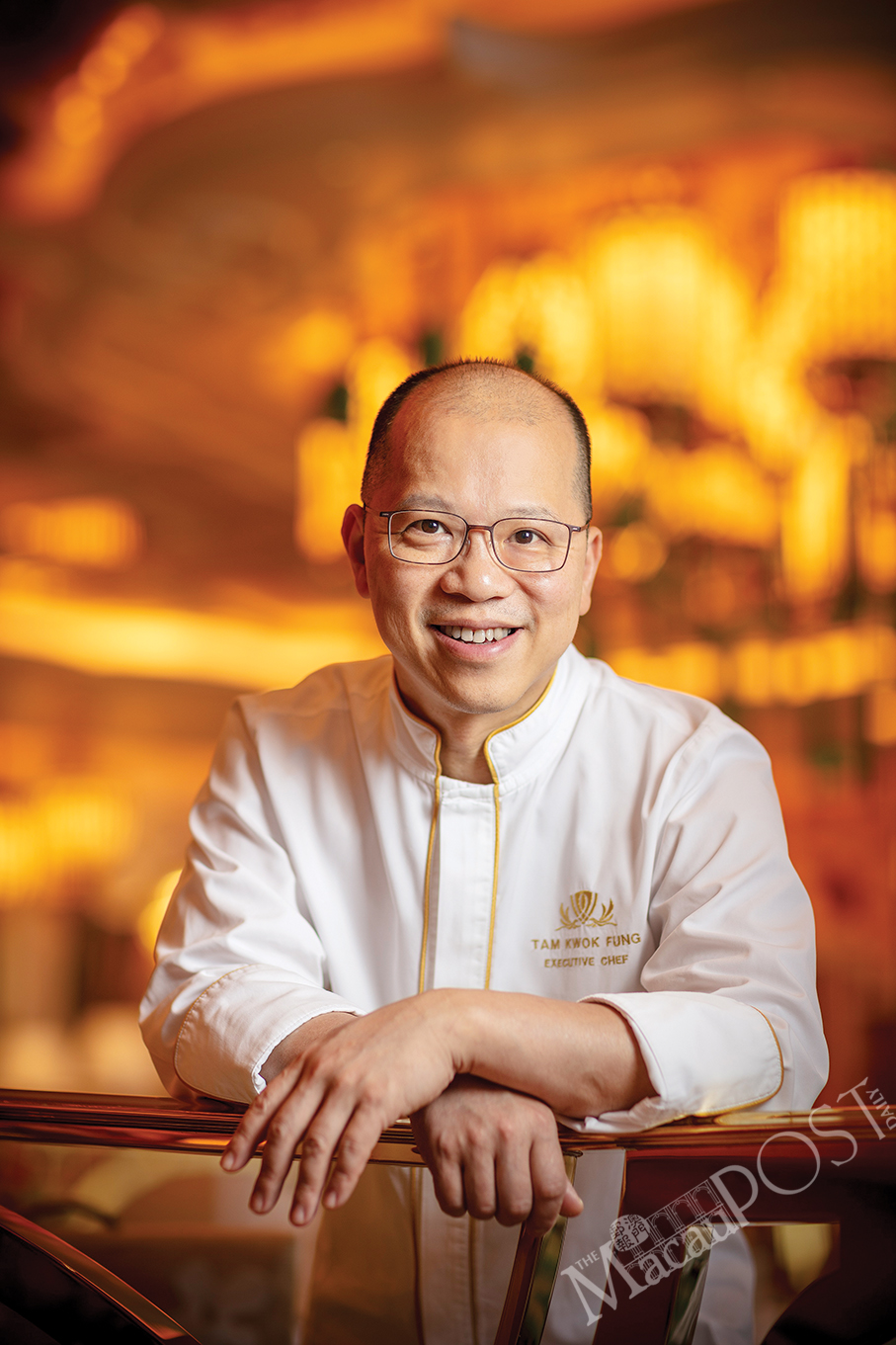
Executive Chef of Wing Lei Palace Tam Kwok Fung.
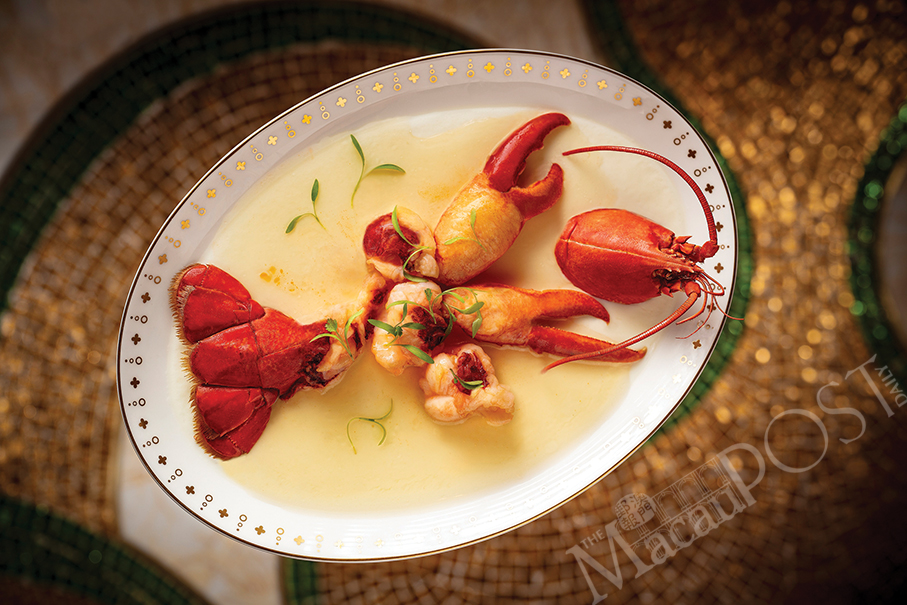
Steamed Lobster with 20 year aged Hau Diao and Egg White.
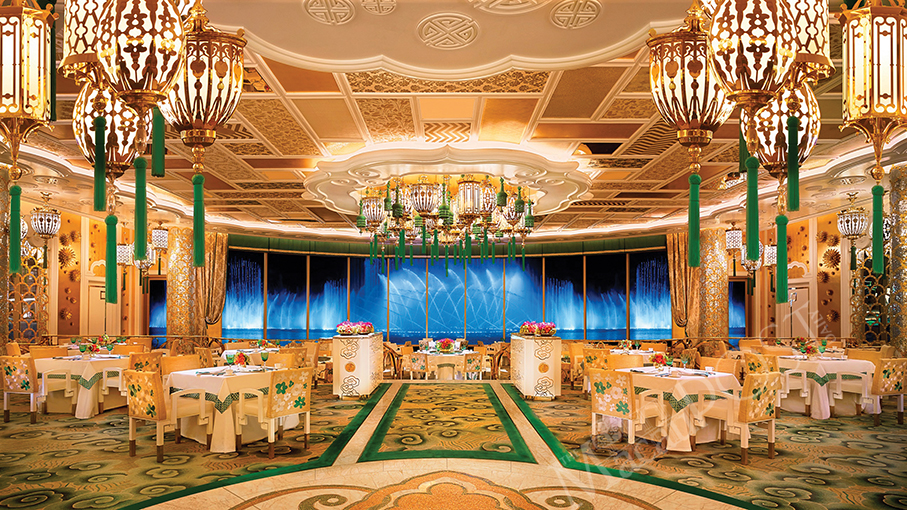
Wing Lei Palace’s main dining hall
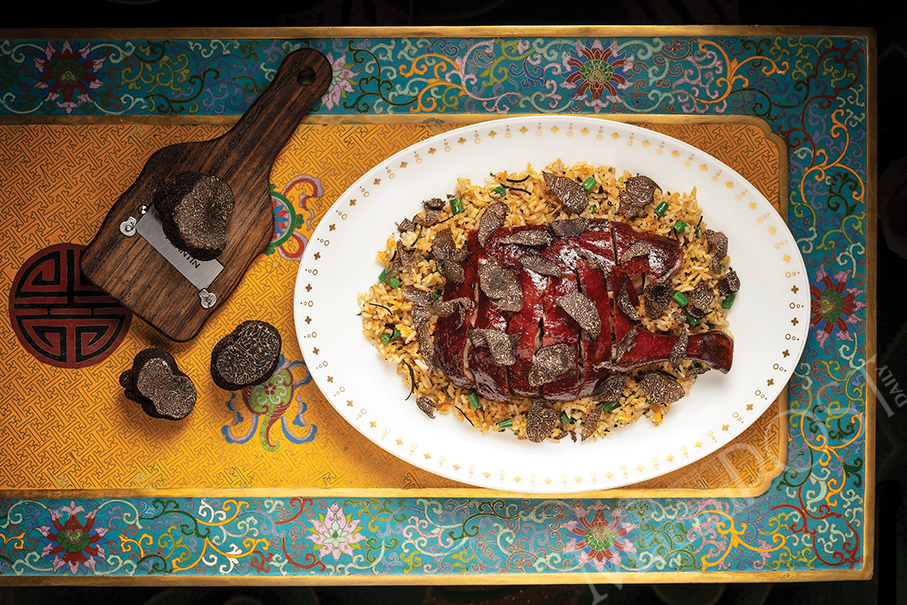
Vegetable fried rice with lychee wood roasted goose.
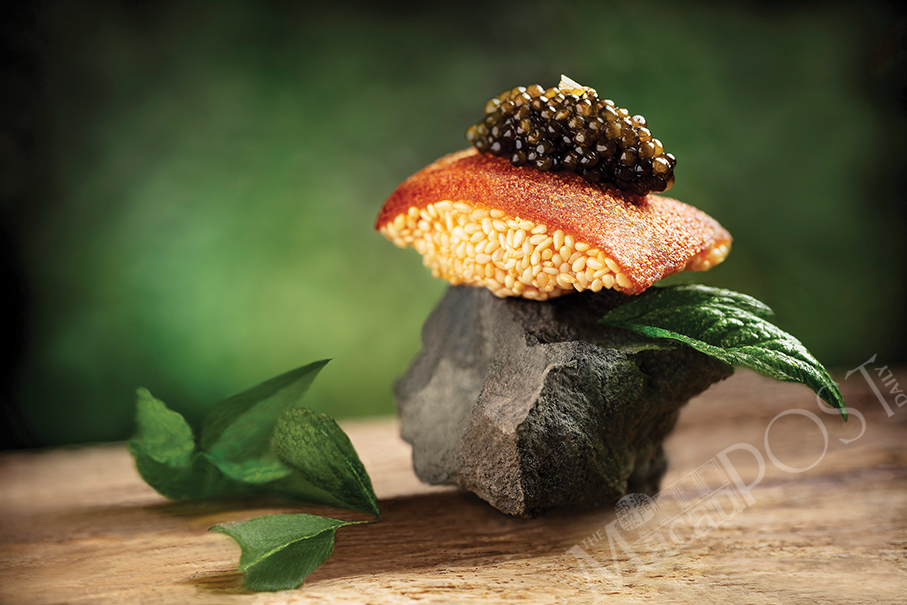
Barbecued suckling pig filled with minced shrimps topped with caviar
Photos: Wynn Palace







